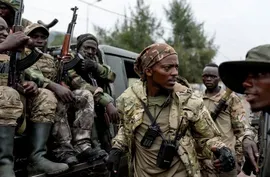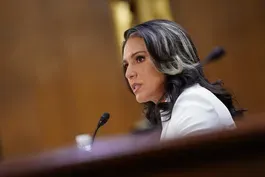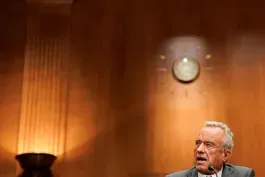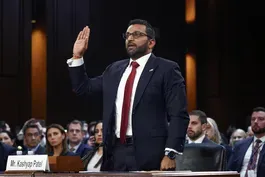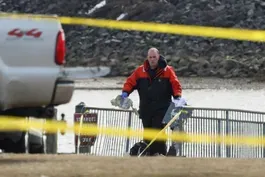
Experts weigh in on concerns surrounding Gabbard, Patel
Clip: 1/30/2025 | 7m 55sVideo has Closed Captions
National security experts share thoughts on concerns surrounding Gabbard and Patel
To discuss the confirmation hearings of Tulsi Gabbard as director of national intelligence and Kash Patel to lead the FBI, Amna Nawaz spoke with two leading voices in the intelligence community, Frank Montoya Jr., a national security analyst and retired FBI official, and Jamil Jaffer, executive director of the National Security Institute at George Mason University.
Major corporate funding for the PBS News Hour is provided by BDO, BNSF, Consumer Cellular, American Cruise Lines, and Raymond James. Funding for the PBS NewsHour Weekend is provided by...

Experts weigh in on concerns surrounding Gabbard, Patel
Clip: 1/30/2025 | 7m 55sVideo has Closed Captions
To discuss the confirmation hearings of Tulsi Gabbard as director of national intelligence and Kash Patel to lead the FBI, Amna Nawaz spoke with two leading voices in the intelligence community, Frank Montoya Jr., a national security analyst and retired FBI official, and Jamil Jaffer, executive director of the National Security Institute at George Mason University.
How to Watch PBS News Hour
PBS News Hour is available to stream on pbs.org and the free PBS App, available on iPhone, Apple TV, Android TV, Android smartphones, Amazon Fire TV, Amazon Fire Tablet, Roku, Samsung Smart TV, and Vizio.
Providing Support for PBS.org
Learn Moreabout PBS online sponsorshipAMNA NAWAZ: For more now on the confirmation hearings of Tulsi Gabbard and Kash Patel, I'm joined by two leading voices in the intelligence community, Frank Montoya Jr., national security analyst and retired senior FBI official, and Jamil Jaffer, executive director of National Security Institute at George Mason University.
Gentlemen, welcome and thanks for joining us.
Jamil, let's begin with Tulsi Gabbard here.
What concerns did you have about her potentially occupying this role as the nation's top-ranking intelligence official going into the hearing?
And were those concerns answered after the hearing?
JAMIL JAFFER, Former Senior Counsel, House Intelligence Committee: Well, Amna, I think there's some challenges with some of the things that Tulsi Gabbard said in the past.
We know about her meetings with Bashar Assad.
We know about what she said about the invasion of Ukraine by Russia.
And, obviously, we saw today very tough questions about Edward Snowden and her views on him and whether he's a traitor or a whistle-blower.
And she did not, she did not affirmatively say that he was a traitor, even though a number of members of the Senate asked her that question.
So I think those were open questions going in.
I think she punted on some of those.
But on the toughest questions, the ones on Snowden, she didn't do what I think she needed to do, which is to come out and say affirmatively what the vast majority of the members of that committee believe, if not all of them, that he in fact is a traitor to the United States, having violated laws by disclosing classified information publicly along a variety of programs, many of which, almost all of which have nothing to do with the privacy and civil liberties of Americans.
AMNA NAWAZ: And, Jamil, just briefly, on those two examples, the meeting with Bashar al-Assad and the comments about Snowden, why do those two examples, in particular, sound alarm bells within the intelligence community?
JAMIL JAFFER: Well, look, obviously, if you want to be representing all of the 17 intelligence agencies and be coordinating them and be the president's chief national intelligence adviser, it's hard to have that position and also say to the intelligence community the single most significant disclosure of classified information in history is not a traitor.
He took all that information knowingly, knowing it was highly classified, disclosed it to the public, took a lot of it back to Moscow with him, where he now lives as a Russian citizen under the protection of Vladimir Putin, and all that's fine.
It's hard to be the chief spokesperson, chief coordinator of the intelligence community if that's your point of view.
AMNA NAWAZ: All right, Frank, let's turn to Kash Patel now.
You saw, of course, he faced a lot of tough questions in that hearing, and I want to bring to you just a piece of news as well.
CNN is now reporting that at least six senior FBI officials have been ordered to retire, resign, or be fired from the agency by Monday.
Some of them, CNN reports, were notified of that while Mr. Patel was in his confirmation hearing.
You saw him face those questions about a potential campaign of political retribution here.
Do you have concerns about that after watching his hearing performance?
FRANK MONTOYA JR., Former FBI Official: Yes, to me, this is just more evidence that that's going to happen, that it's not going to stop with his nomination, and he's going to do what he told these senators that he would do, which was to act in accordance with the law.
They're just going to -- the White House is going to call the shots here.
They're going to just continue to take aim at who they consider their not just political enemies, but personal enemies in some respects.
I mean, you look at that -- the book that he wrote and the things that he has said on a bunch of these podcasts, where he's definitely targeting individuals because of personal disagreements.
And it has nothing to do with politics, in the sense that they were just doing their job.
They were just living up to their oath.
And then he says, well, that's what I'm going to do.
And yet these guys are getting moved around.
For what reason?
Because they don't agree with what -- a particular agenda?
They didn't take an oath of office to a person.
They took their oath of office to the Constitution.
And they're being punished for doing that.
AMNA NAWAZ: Frank, in terms of some specific steps he's proposed, though, he's talked about decreasing the size of the agency, sending FBI agents across the country to go be cops, as he put it.
How do you look at those steps?
How would they impact the FBI's ability to carry out its job?
FRANK MONTOYA JR.: If the effort is to make the organization more efficient in the execution of its duties, that's fine, but that's not what this is about.
These six individuals that have been told to either retire, resign or quit, that's case in point.
The reality of the situation is, the FBI is not broken.
It is not corrupt.
And the narrative on which these individuals are basing all of their actions, Patel or even the folks in Congress, in the Senate, the narrative that they're basing their decision-making on, it's bogus.
It's all based on lies.
And the reality is this.
If it weren't, then how come the bureau is still able to do the job that it does as effectively as it does?
I mean, did they not participate with the rest of the intelligence community in stopping an Iranian plot to assassinate Donald Trump?
The work goes on.
And yet all the focus seems to be on settling scores.
And there's no way, if he's focused on settling scores, that Patel is going to be able to lead this organization.
AMNA NAWAZ: Jamil, let me ask you to take a step back here, because, when you look at both of these nominees, the roles that they would fill in this Trump administration, their qualifications, their evolution of thought, their relationship to President Trump, what do you think their confirmations would mean for the larger intelligence community, how it works and how agencies work together?
JAMIL JAFFER: Well, look, I mean, obviously, these are nominees that the president believes in and supports as of today.
Whether he maintains his support for somebody like Tulsi Gabbard down the road, under pressure from the Senate, we will see.
But if both of these individuals are confirmed, in particular, Gabbard at DNI, I think you're going to see concerns amongst the intelligence community about whether they can trust somebody in that position who's defended a thief of government information, a traitor like Edward Snowden, somebody who said that the most -- single most critical intelligence community collection tool, Section 702, is something that should not be reauthorized.
She's changed her position on that in the last few weeks, but that was her position for a long time.
Somebody who's cozied up to a dictator like Bashar Assad, who used chemical weapons against his own people.
She's questioned the credibility of intelligence that demonstrates he used gas against his own people.
So these are hard questions.
And with Kash Patel, right, look, this is somebody who served in the Justice Department at the National Security Division.
He knows the space.
At the same time, he wrote a book entitled "Government Gangster."
He wrote a book listing a bunch of executive branch officials which he says are members of the deep state, including nearly a dozen members of the Trump administration itself, Bill Barr, Alyssa Farah, folks like that.
And so -- Pat Cipollone, who I know from the Justice Department.
These are people who served in the Bush administration, in the White House, the Justice Department, elsewhere.
And so you have got to say, are these the right kind of people that President Trump wants to put in place?
He said they are.
We will see what the Senate does about it.
But I do think, particularly with Gabbard, he's going to come under significant pressure to address that nomination.
AMNA NAWAZ: Frank, I have got less than a minute left.
What's your take?
FRANK MONTOYA JR.: Yes, more or less the same.
The thing is, yes, he's president of the United States.
He has the right to pick who he wants for these jobs.
But let's talk about qualifications, for instance, in a person like Kash Patel.
I served under four directors, and they were either federal judges or very experienced prosecutors, U.S. attorneys on top of that.
They had that experience.
This is a guy who, yes, he worked for the DOJ for, what, three years, but he was a junior prosecutor, at best -- a junior prosecutor, at best.
So the challenge is, what kind of experience does he have to lead an organization like this, where it's not just about criminal investigations, but it's those very critical national security functions that the bureau is responsible for?
It's a challenge.
AMNA NAWAZ: Frank Montoya Jr., Jamil Jaffer, thank you to you both.
We appreciate your time.
FRANK MONTOYA JR.: Thank you.
Congo's foreign minister describes rebel offensive
Video has Closed Captions
Congo's foreign minister describes unstable conditions as rebels seize territory (6m 49s)
Gabbard appears headed to a close vote in Senate
Video has Closed Captions
National intelligence nominee Gabbard faces tough questions over Russia, Syria and Snowden (4m 23s)
Neko Case reveals difficult journey to stardom in new book
Video has Closed Captions
Neko Case reveals difficult journey to stardom in 'The Harder I Fight the More I Love You' (6m 31s)
News Wrap: Hamas frees 8 hostages in 3rd round of exchanges
Video has Closed Captions
News Wrap: Hamas frees 8 hostages, Israel releases 100 prisoners in 3rd round of exchanges (4m 50s)
Republican senators express doubts about RFK Jr. in hearing
Video has Closed Captions
Republican senators express doubts about RFK Jr. in latest confirmation hearing (3m 48s)
Senators ask FBI director nominee Patel about 'enemies list'
Video has Closed Captions
Senators ask FBI director nominee Kash Patel about 'enemies list' and politicization (3m 35s)
What investigators revealed about the plane crash in D.C.
Video has Closed Captions
What investigators revealed about the jet and helicopter collision in D.C. that killed 67 (7m 57s)
What led up to the worst U.S. aviation disaster since 2001
Video has Closed Captions
Breaking down the moments that led up to the worst U.S. aviation disaster since 2001 (6m 23s)
Providing Support for PBS.org
Learn Moreabout PBS online sponsorshipMajor corporate funding for the PBS News Hour is provided by BDO, BNSF, Consumer Cellular, American Cruise Lines, and Raymond James. Funding for the PBS NewsHour Weekend is provided by...

